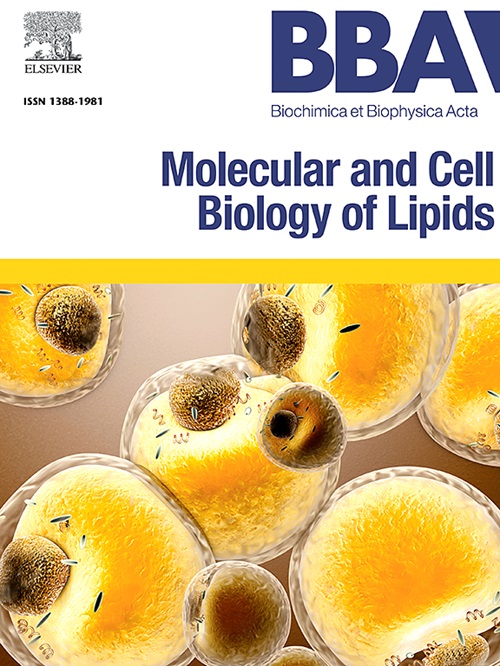Acetyl-CoA acyltransferase 2 as a metabolic modulator: Unraveling its impact on hepatic lipid dynamics in chicken embryos
IF 3.3
2区 生物学
Q2 BIOCHEMISTRY & MOLECULAR BIOLOGY
Biochimica et biophysica acta. Molecular and cell biology of lipids
Pub Date : 2025-07-28
DOI:10.1016/j.bbalip.2025.159674
引用次数: 0
Abstract
Despite the established role of acetyl-CoA acyltransferase 2 (ACAA2) in hepatic lipid homeostasis in mammals, its function in regulating hepatic lipid metabolism during the embryonic stage of chickens remains unexplored. This study aimed to explore the regulatory role of ACAA2 in hepatic lipid metabolism and investigate its molecular mechanisms in chicken embryos. A recombinant ACAA2-shRNA plasmid was successfully constructed for targeted suppression of ACAA2 expression. Knockdown of ACAA2 significantly increased triglyceride content, promoted lipid droplet accumulation, and upregulated lipogenesis-related gene expression in chicken embryos. The knockdown of ACAA2 significantly suppressed both mRNA and protein expression of peroxisome proliferator-activated receptor α (PPARα) and carnitine palmitoyl transferase 1 (CPT1), while conversely upregulating sterol regulatory element binding protein-1c (SREBP-1c) mRNA and protein expression. Notably, these metabolic alterations caused by ACAA2 knockdown were markedly reversed by the activation of PPARα in primary chicken embryonic hepatocytes, suggesting functional crosstalk between the ACAA2 and PPARα signaling pathways. These results indicate that fat accumulation action of the knockdown of ACAA2 was due to enhancing SREBP-1c expression and reducing PPARα expression. In present study, ACAA2 was identified as a critical modulator of embryonic lipid metabolism, offering a target for interventions to reduce embryonic mortality or metabolic diseases in poultry.
乙酰辅酶a酰基转移酶2作为代谢调节剂:揭示其对鸡胚胎肝脂质动力学的影响
尽管乙酰辅酶a酰基转移酶2 (ACAA2)在哺乳动物肝脏脂质稳态中的作用已得到证实,但其在鸡胚胎期调节肝脏脂质代谢的功能仍未被探索。本研究旨在探讨ACAA2在鸡胚肝脂质代谢中的调节作用,并探讨其分子机制。成功构建了靶向抑制ACAA2表达的重组ACAA2- shrna质粒。敲低ACAA2显著增加鸡胚甘油三酯含量,促进脂滴积累,上调脂肪生成相关基因表达。低表达ACAA2可显著抑制过氧化物酶体增殖物活化受体α (PPARα)和肉碱棕榈酰转移酶1 (CPT1) mRNA和蛋白的表达,而上调甾醇调节元件结合蛋白1c (SREBP-1c) mRNA和蛋白的表达。值得注意的是,这些由ACAA2敲低引起的代谢改变被原代鸡胚胎肝细胞中PPARα的激活显著逆转,这表明ACAA2和PPARα信号通路之间存在功能性串扰。这些结果表明,ACAA2基因下调的脂肪积累作用是由于SREBP-1c表达增强和PPARα表达降低。在本研究中,ACAA2被确定为胚胎脂质代谢的关键调节剂,为降低家禽胚胎死亡率或代谢性疾病的干预提供了靶点。
本文章由计算机程序翻译,如有差异,请以英文原文为准。
求助全文
约1分钟内获得全文
求助全文
来源期刊
CiteScore
11.00
自引率
2.10%
发文量
109
审稿时长
53 days
期刊介绍:
BBA Molecular and Cell Biology of Lipids publishes papers on original research dealing with novel aspects of molecular genetics related to the lipidome, the biosynthesis of lipids, the role of lipids in cells and whole organisms, the regulation of lipid metabolism and function, and lipidomics in all organisms. Manuscripts should significantly advance the understanding of the molecular mechanisms underlying biological processes in which lipids are involved. Papers detailing novel methodology must report significant biochemical, molecular, or functional insight in the area of lipids.

 求助内容:
求助内容: 应助结果提醒方式:
应助结果提醒方式:


